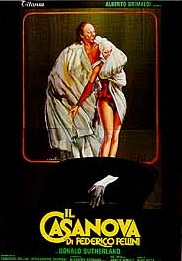- Fellini's Casanova
Infobox Film | name = Fellini's Casanova

image_size = 175px
caption = original film poster
director =Federico Fellini
producer =Alberto Grimaldi
writer =Federico Fellini Bernardino Zapponi
starring =Donald Sutherland Tina Aumont Cicely Browne Carman Scarpitta
Daniel Emilfork
Dan van Husen
music =Nino Rota
cinematography =Giuseppe Rotunno
editing =Ruggero Mastroianni
costume design =Danilo Donati
distributor = Twentieth Century Fox Home Entertainment, Inc.
released = 1976
runtime = 148 min. DVD release
language = Italian / English / French / German
budget =
imdb_id = 0074291"Fellini's Casanova" ("Il Casanova di Federico Fellini") is a 1976
Academy Award -winning Italian film by directorFederico Fellini .It was adapted from the autobiography of
Giacomo Casanova , the 18th century adventurer and writer.Plot
A carnival in
Venice is the prelude to a series of erotic encounters that follow Giacomo Casanova through the cities of 18th century Europe. It is the age ofVoltaire – sexual and intellectual awakenings abound.Instead of adventure though, Casanova's life becomes a freakish journey into sexual abandonment. Any meaningful emotion or sensuality is eclipsed by increasingly strange situations. In Venice he defiles a nun for the pleasure of a voyeur, in
Paris he attempts to convert a mature woman's soul into a man's (using intercourse), and inDresden his body is pounded by two hefty women and a hunchback. Hence the film's narrative presents Casanova's adventures in a detached, methodical fashion, as the respect he yearns for is constantly undermined by more basic urges.The script also highlights a number of other incidents from Casanova's life, including his escape from a Venetian prison and his visit to a London
Frost fair .The film was shot entirely in Rome's
Cinecittà studios and received an Academy Award for Best Costume Design, with the Oscar going toDanilo Donati .Fellini-esque
"Fellini’s Casanova" is often noted for its symbolic, highly stylised "
mise en scène " and the casting ofDonald Sutherland in the lead role. By using a range of visual effects Fellini attempted to depict Casanova as a debauched figure incapable of displaying any genuine emotion. Fact|date=September 2008This Fellini-esque signature is most noticeable in Sutherland’s acting and appearance which was made overtly graphic at the director's request. Other unusual techniques include a scene where Sutherland rows across a stormy sea made from black plastic sheets. Fact|date=September 2008
Fellini’s dislike of the character was well documented and in one interview he even referred to exposing "the void" of Casanova's life. [Bondanella, Peter (eds.) "Casanova: An Interview with Aldo Tassone." Essays in Criticism: Federico Fellini (Oxford: Oxford University Press). p29.] Consequently, Fellini’s interpretation goes against the more traditional notion of Casanova as an enlightened gadabout. Donald Sutherland explains in an interview that Fellini's dislike of Casanova was somewhat lessened during the filming of the mechanical doll scene, which inspired Fellini to rewrite the ending. [cite interview | last=Sutherland |first=Donald |title=Casanova, Fellini, and Me | program=Fellini's Casanova DVD Extras Dubious|date=September 2008]
Awards and nominations
1977 Academy Award,
USA
* Winner - Best Costume Design (Danilo Donati)
* Nominated - Screenplay Based on Material from Another Medium (Federico Fellini, Bernardino Zapponi)1977
David di Donatello Awards ,Italy
* Winner - Best Music (Nino Rota)1978
BAFTA ,Great Britain
* Winner - Best Costume Design (Danilo Donati)
* Winner - Best Production Design/Art Direction (Danilo Donati, Federico Fellini)
* Nominated - Best Cinematography (Giuseppe Rotunno)ee also
*
Federico Fellini
*Cinema of Italy
*Giacomo Casanova
*"Histoire de ma vie ", Casanova's autobiography
*Carnival of Venice References
External links
*
*
*
Wikimedia Foundation. 2010.
